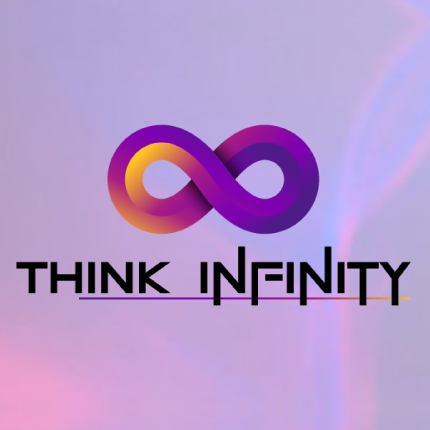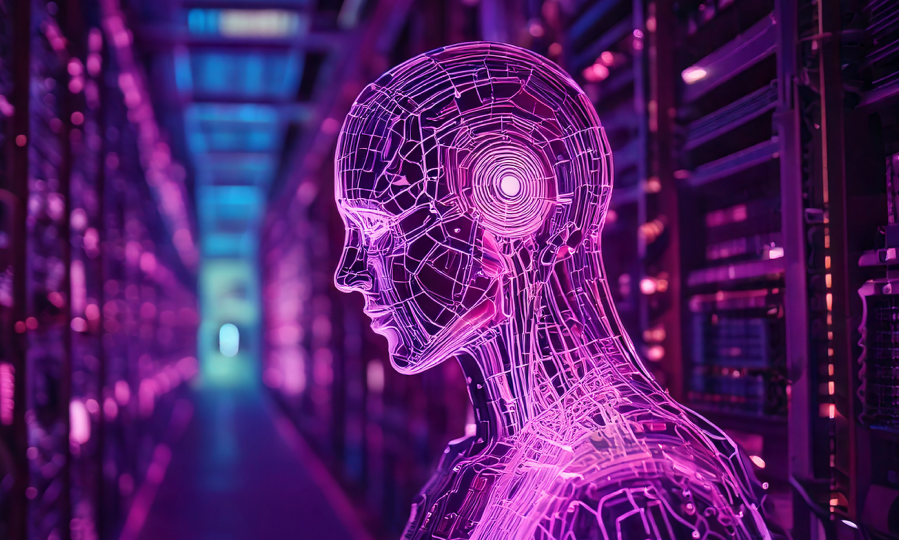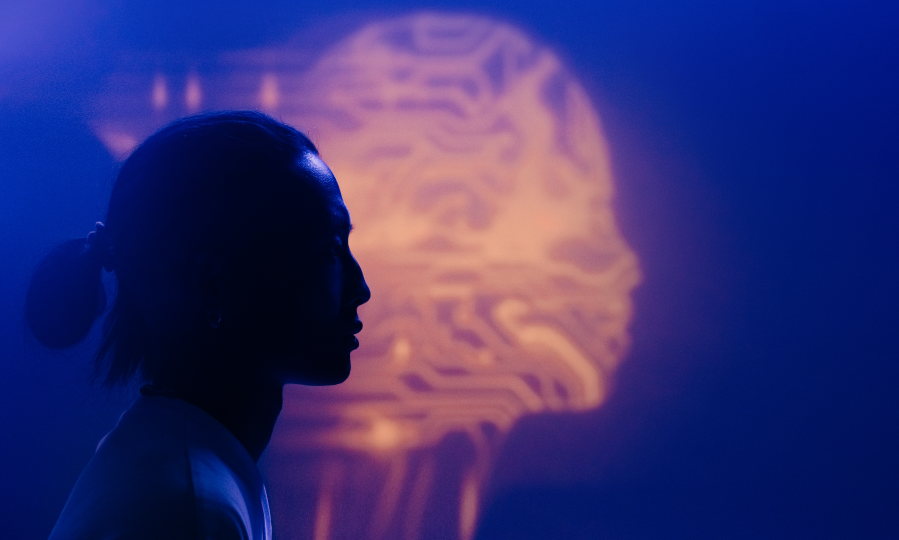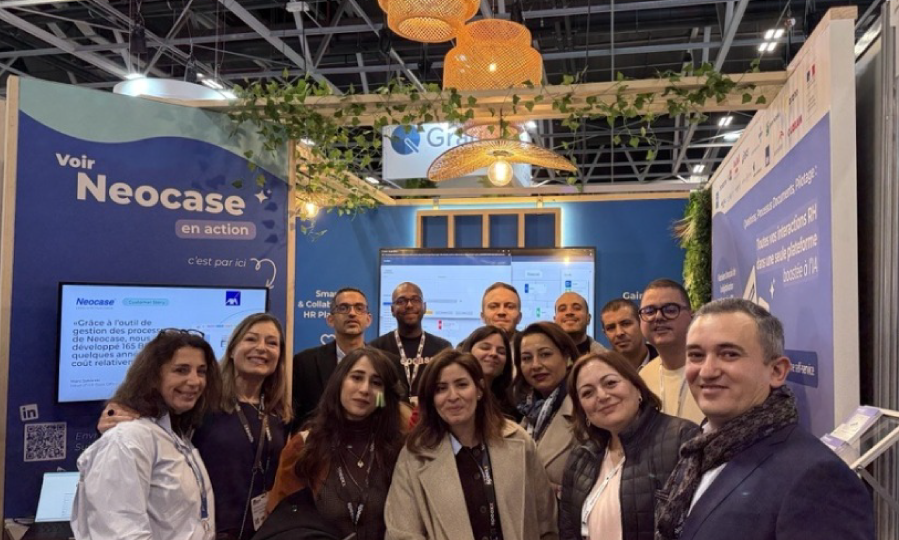HR TRENDS
The impact of AI on employees

SHARE THE ARTICLE ON

Artificial intelligence is changing the employee experience
AI is already present in many aspects of our personal lives and used in daily activities, sometimes without us even knowing it: chatbots, personalized recommendations, optimized routes... Since November 2022 with ChatGPT and its generative capabilities, it has spread at incredible speed, invading our professional, educational and personal spaces
How will AI change life in the workplace? How can it help in the work environment? Will machines replace humans in the long term, and what jobs will be affected? These are just some of the questions and challenges that companies and organizations will have to face.
The impact of AI on jobs
Like many other major technological revolutions (mechanization, robots, computers, the Internet) that have turned our lifestyles and workplaces upside down, AI has created a great deal of fear and led to mistrust in the workplace.
According to a new study by the International Labor Organization (ILO), generative AI is more likely to produce more jobs rather than eliminate jobs, by automating certain tasks rather than replacing people.
The study suggests that most jobs and industries are only partially exposed to automation and are unlikely to be replaced by the latest wave of generative AI.
As a result, the biggest impact of this technology is unlikely to be the elimination of jobs, but rather potential changes in job quality, particularly the intensity of the workload and autonomy.
Numerous studies on the subject seem to disprove the most pessimistic points of view. These studies indicate a profound transformation of how we work. A government report entitled "AI, our ambition for France" states that "in 19 out of 20 jobs, there are tasks that AI cannot perform". The report also specifies "that the jobs that could be directly replaced by this technology would amount to only 5% of jobs in a country like France. Another lesson from this report: the spread of AI should, on the contrary, generate jobs "in new professions, but also in old professions."
![]() We are learning as we go along. We don't know what tomorrow's real uses will be, but in the meantime, we can't take the risk of not training. We need to get everyone on board for this change. In-house AI
is not just an HR issue, but a matter for the entire company."
We are learning as we go along. We don't know what tomorrow's real uses will be, but in the meantime, we can't take the risk of not training. We need to get everyone on board for this change. In-house AI
is not just an HR issue, but a matter for the entire company."
Louis-Maxime Nègre, Sopra Group Human Resources Director
AI for employees: a boost for productivity
Today, it's impossible to ignore AI, or even resist this major technological change that is turning our companies and the workplace upside down. To master this technology, people need to learn more about it and follow the training programs offered in-house. For example, learning how to write prompts to obtain more accurate responses from the system. Regular refresher sessions are essential, as the capabilities of this intelligent technology are rapidly changing.
The rise of AI will not, however, prevent humans from remaining in control. To optimize use, you need to be able to analyze the relevance and reliability of the answers obtained. This ability to confirm the machine's results will enable us to retain control over decisions that will continue to be the responsibility of humans.
This technology can offer many advantages that are still poorly understood by employees who are not familiar with it. There's a certain optimism about these upcoming changes, because they should be of great help for employees, departments or teams in their daily tasks.
In this context, the challenge for HR is to provide employees with the keys to understanding these technologies and help them adapt in the workplace. Knowing how to integrate and use AI wisely in day-to-day work can bring real benefits.
Free employees from time-consuming, repetitive tasks
AI can already automate time-consuming everyday tasks, such as processing data, analyzing documents, handling emails or writing meeting reports. If kept under control, AI can provide invaluable support for any employee in automating simple, repetitive daily tasks that require little thought. By delegating this work to the system, employees can have more time to spend on the more demanding, delicate and complex facets of their work.
![]() AI should be useful for employees to carry out administrative tasks and free up time for human interaction and increase skills on other subjects."
AI should be useful for employees to carry out administrative tasks and free up time for human interaction and increase skills on other subjects."
Catherine Chavanier, Group Human Resources Director, CDC Habitat
The use of AI and its development in companies will generate a new way of working. This will shake up habits, workflows and internal organization methods. But that's not all. By freeing employees from repetitive, time-consuming administrative tasks, AI will enable them to focus on tasks that are more specific to their jobs or develop new skills. Employees can thus devote more time to thinking, being creative, providing support or performing more strategic tasks. The development of the employee experience should eventually enable personalized support throughout the career.
![]() So that AI doesn't become just another tool, it's up to the company to develop and optimize its use for everyone. Support from HR and IT is essential."
So that AI doesn't become just another tool, it's up to the company to develop and optimize its use for everyone. Support from HR and IT is essential."
Madeleine Podeur, Director of Human Resources, Omnium Group
A tool for improving employee relations, engagement and well-being at work
An in-house chatbot will save time... and help people. Based on AI, next-generation chatbots will use continuously updated machine learning techniques to analyze text and generate a personalized response. Specific questions about leave and benefits, for example, can be answered quickly. Chatbots are accessible 24/7, can be customized by each company and can simplify employees’ daily tasks.
And if we think about it further, these results could have a positive effect on personal satisfaction and fulfillment. These are all elements that contribute to a feeling of well-being at work. This is confirmed by a government report "AI, our ambition for France": "AI can increase quality of life at work ... users actually report being more fulfilled and performing better since they don’t have to focus routine tasks anymore".
When carefully integrated into employees' daily tasks, AI becomes a real ally, enabling everyone to enhance the quality and impact of their work. It's an invaluable boost for the employee experience and can increase engagement.
The idea of well-being in the workplace is also described in the “AI or the future of recruitment” report by Indeed. According to the report, HR professionals state that AI would improve employees' overall satisfaction with their work (65% compared to 54% before AI), their motivation (60% compared to 49%), their feeling of happiness at work (60% compared to 51%) as well as their level of stress (65% compared to 54%).).
![]() These new digital assistants will enable HR to provide an even more personalized response to each situation. By boosting interaction and support for employees, the use of AI will change the relationship between
employees and HR."
These new digital assistants will enable HR to provide an even more personalized response to each situation. By boosting interaction and support for employees, the use of AI will change the relationship between
employees and HR."
Véronique Montamat, Director of Marketing & HR Prospectives at Sopra HR Software.
In terms of quality of life at work and mental health, AI also offers other opportunities: "AI can analyze data measuring an employee’s well-being, analyze relationships between co-workers, establish personalized action programs well-being, measure the return on investment of these actions and detect mental health problems early" notes the Ministry of Transformation in a 2024 HR study.
AI to assist managers
AI can help managers with time-consuming administrative tasks, such as approving leave, managing schedules and preparing interviews. They can thus be more available for their teams, more attentive, proactive in managing talent and better equipped to face the company's challenges.
![]() Artificial intelligence should be an aid to people, a tool that supports managers by helping to compile, summarize and reformulate information, while ensuring transparency and explainability. Managers are still
in charge of analyzing and decision-making, using AI responsibly, and will maintain a closer relationship with their teams, which is a key part of our practices." Cyrille Garnier, Director of the Fundamentals and Innovation Department, Sopra Steria Group
Artificial intelligence should be an aid to people, a tool that supports managers by helping to compile, summarize and reformulate information, while ensuring transparency and explainability. Managers are still
in charge of analyzing and decision-making, using AI responsibly, and will maintain a closer relationship with their teams, which is a key part of our practices." Cyrille Garnier, Director of the Fundamentals and Innovation Department, Sopra Steria Group
Managers would thus be more available to take employees’ needs into account. AI can also help detect and even anticipate psychosocial problems within a group of employees or a department.
![]() Some managers would like to use AI to measure the psycho-social risks of a group or department and detect any tensions within a team at an earlier stage, based on data. This new technology could eventually help
us work in this direction."
Some managers would like to use AI to measure the psycho-social risks of a group or department and detect any tensions within a team at an earlier stage, based on data. This new technology could eventually help
us work in this direction."
Aurélie Eray, Deputy HR Director and Director of HRIS projects at CEA
Used wisely, AI can become a manager’s greatest ally, helping them in their daily activities, managing HR deadlines and anticipating certain tasks.
How does HR support the adoption of AI to ensure its implementation?
The challenge for HR is to provide employees with the keys to understanding this new technology and helping them adopt new methods. This includes:
- Deploying an AI adoption program to all people and all levels in the company, to provide support, reduce fears and resistance, and improve understanding of the issues behind the use of AI.
- Supporting the transformation of certain jobs requiring employees to work together or share tasks with robots, or with AI embedded in IT tools or solutions.
- Modifying training and development plans to turn the company into a 'learning company'.
During the training and learning phase, the challenge will be to ensure that no employee is left behind, to avoid de-skilling, and to reduce the knowledge gap between beginners and the most advanced.
Today, nobody knows what tomorrow's applications will be, but in the meantime we can’t risk not training people in AI. Employees therefore need to adopt it not only to know how to use it to improve their work efficiency, but also to take a critical look at the information provided.
![]() Successfully meeting this AI challenge requires a good adoption strategy. The company must support its employees during this time of change." Anne Grjebine, Senior HR Innovation Consultant, Air France
Successfully meeting this AI challenge requires a good adoption strategy. The company must support its employees during this time of change." Anne Grjebine, Senior HR Innovation Consultant, Air France
Supervising the use of AI, striking a balance between innovation and the human element
To ensure that AI is used appropriately, companies will need to consider developing a general framework to determine rules and indicate which tasks will be entrusted to AI and which will be performed by people. They will also need to define operating methods and establish boundaries. Companies must remain vigilant on the relationship between people and machines and ensure that humans make the decisions. Another challenge for companies will be to ensure that the employees’ quality of life in the workplace does not deteriorate (hyper-connectivity, dehumanization, feeling of alienation, higher stress) with an increased risk to their mental health. Safeguards will need to be implemented for this last point. A report by the French Ministry of Transformation on AI sums up the situation: "The more digital technology we use, the more we will need humans."




